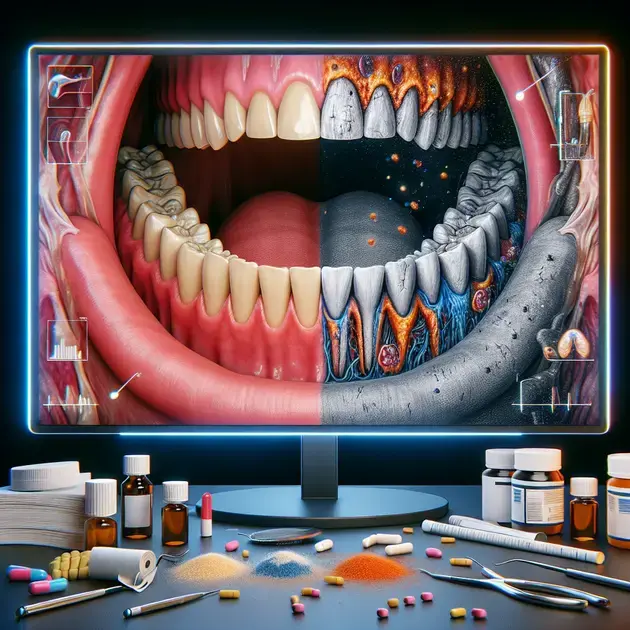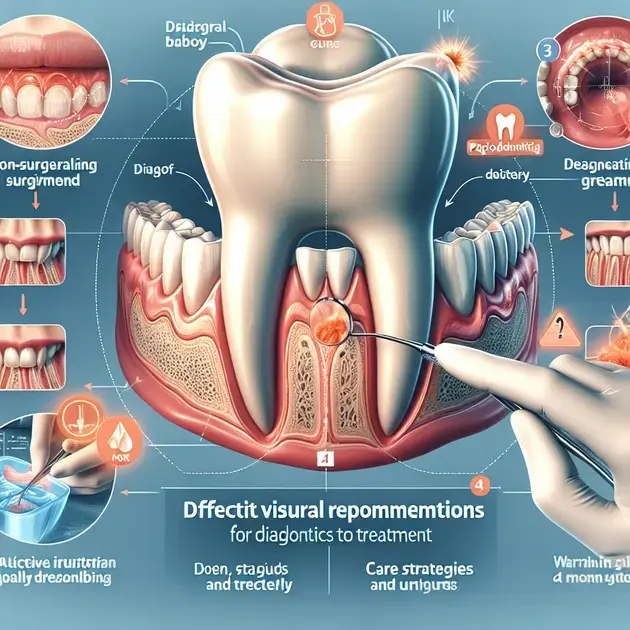Periodontitis can be a challenging condition to treat, but with the right medication, it can be effectively managed. In this comprehensive guide, we will explore the most effective medications available for periodontitis and how they can help improve your oral health.
From antibiotics to antiseptic mouthwashes and advanced treatments like laser therapy, there are various options when it comes to treating periodontitis. Understanding the benefits and potential side effects of each medication is crucial in developing an effective treatment plan. Let’s dive into the world of periodontitis medication and find out what works best for you.

Effective Medication for Periodontitis Explained
When it comes to treating periodontitis, it’s essential to understand the different medications available and how they can help in managing the condition. One effective medication often prescribed for periodontitis is chlorhexidine mouthwash. This antimicrobial mouthwash helps to reduce the levels of bacteria in the mouth, preventing further inflammation and infection.
To use chlorhexidine mouthwash effectively, start by carefully measuring the recommended amount in the cap provided. Then, rinse your mouth thoroughly for about 30 seconds, making sure to reach all areas of your mouth. It is typically recommended to use this mouthwash twice a day for the best results. You can find more information about chlorhexidine mouthwash and its benefits on reputable medical websites such as WebMD.
Choosing the Right Medication for Your Needs
When choosing the right medication for your periodontitis needs, it’s essential to consult with your dentist or periodontist. They will be able to evaluate your specific condition and recommend the most suitable treatment plan for you. Typically, antibiotics such as doxycycline or minocycline are prescribed to manage periodontitis, especially in cases where the infection is severe.
To obtain the right medication for your condition, schedule an appointment with your dentist for a thorough evaluation. Based on their assessment, they will prescribe the appropriate antibiotics or antimicrobial mouthwash to help control the progression of periodontitis. You can also research more about antibiotic treatments for periodontitis on trusted dental websites like the American Dental Association.
Understanding Potential Side Effects and Benefits
Like any medication, treatments for periodontitis can have potential side effects that you should be aware of. Antibiotics, for example, may cause gastrointestinal issues such as nausea or diarrhea in some individuals. It is crucial to discuss any potential side effects with your dentist before starting any medication to manage periodontitis.
On the other hand, the benefits of proper medication for periodontitis can be significant. By effectively managing the condition with the right medication, you can prevent further damage to your gums and teeth, ultimately preserving your oral health. To learn more about the potential side effects and benefits of periodontitis medications, visit authoritative dental platforms like Colgate Oral Care Center.

Choosing the Right Medication for Your Needs
When it comes to selecting the most suitable medication for your health needs, it is important to consider various factors to ensure the best outcome. One key aspect to keep in mind is the specific condition or symptoms you are looking to address. Consult with your healthcare provider to understand your diagnosis better and the possible treatment options available. Additionally, take into account any allergies or sensitivities you may have to certain medications, as this can influence your choice.
Another crucial consideration is the potential side effects associated with the medication. Some drugs may cause adverse reactions or interactions with other medications you are taking. Researching and discussing these possibilities with your healthcare provider can help you make an informed decision. Moreover, evaluate the benefits of each medication, such as how effectively it addresses your symptoms and whether it offers any long-term advantages for your overall health.
It is also essential to review your lifestyle and daily routine when choosing medication. Some drugs may require specific administration times or dietary restrictions, which can impact your treatment plan. Consider how the medication will fit into your daily life to ensure compliance and maximize its effectiveness. Additionally, factor in the cost of the medication and whether it is covered by your insurance or if there are more affordable alternatives available.
Ultimately, the decision-making process should involve a collaborative effort between you and your healthcare provider. Communicate openly about your preferences, concerns, and expectations regarding the medication to work together towards finding the most appropriate solution for your needs. By considering all these aspects carefully, you can choose the right medication that aligns with your health goals and lifestyle.
Understanding Potential Side Effects and Benefits
Before starting any medication, it is crucial to have a clear understanding of the potential side effects and benefits it may offer. Each medication comes with its own set of risks and advantages, which can vary depending on individual factors such as age, existing health conditions, and medication interactions. Take the time to research and discuss with your healthcare provider the possible side effects that may occur while taking the medication.
Common side effects of medications can range from mild symptoms like nausea or dizziness to more severe reactions that require immediate medical attention. By being aware of these potential outcomes, you can monitor your health closely and address any concerns promptly. On the flip side, understanding the benefits of the medication is equally important to gauge its effectiveness in managing your condition or symptoms.
Discuss with your healthcare provider the expected outcomes of the medication, such as symptom relief, disease management, or preventive effects. Consider how the benefits of the medication align with your health goals and whether they outweigh the potential risks. Additionally, explore alternative treatment options or lifestyle modifications that may offer similar benefits with fewer side effects.
It is essential to weigh the potential side effects against the benefits of the medication to make an informed decision about your treatment plan. Keep an open line of communication with your healthcare provider to discuss any changes in your health status or concerns about the medication’s effects. By understanding the potential side effects and benefits, you can navigate your medication regimen more effectively and optimize your overall health outcomes.
Optimizing Treatment Plans for Periodontitis
When it comes to managing periodontitis, optimizing your treatment plan is essential to effectively control the progression of the disease and maintain oral health. Periodontitis is a chronic inflammatory condition that affects the gums and supporting structures of the teeth, leading to gum disease and potential tooth loss if left untreated. By following a comprehensive treatment plan tailored to your individual needs, you can improve the outcomes of your periodontal care.
One key aspect of optimizing treatment for periodontitis is regular dental check-ups and cleanings to monitor the health of your gums and teeth. Your dentist or periodontist will assess the severity of your condition and recommend appropriate interventions to address any issues. This may include scaling and root planing to remove tartar and bacteria from below the gumline or surgical procedures to repair damaged tissues.
In addition to professional dental care, maintaining good oral hygiene practices at home is crucial for managing periodontitis. Brushing and flossing regularly can help prevent the accumulation of plaque and bacteria that contribute to gum disease. Your healthcare provider may also recommend antimicrobial mouth rinses or prescription medications to control bacterial infections and reduce inflammation in the gums.
Furthermore, lifestyle factors such as smoking, poor nutrition, and stress can impact the severity of periodontitis and the effectiveness of treatment. Making healthy choices like quitting smoking, eating a balanced diet, and managing stress can support your periodontal health and enhance the outcomes of your treatment plan. Discuss with your healthcare provider any lifestyle modifications or habits that may be affecting your oral health to optimize your periodontal care.
By working closely with your dental team and adhering to a customized treatment plan, you can effectively manage periodontitis and preserve the health of your gums and teeth. Regular follow-ups, consistent oral hygiene practices, and healthy lifestyle choices are key components of optimizing treatment for periodontitis and achieving long-term oral health benefits.
Conclusion
Choosing the right medication for your needs involves considering various factors to ensure optimal health outcomes. It is crucial to evaluate your specific condition, consult with healthcare providers, and be mindful of any allergies or sensitivities you may have. Understanding potential side effects, benefits, and lifestyle adjustments are essential steps in making an informed decision. By collaborating with your healthcare provider and aligning the medication with your health goals, you can select the most suitable treatment that fits your lifestyle.
Prior to starting any medication, it is vital to comprehend both the potential side effects and benefits it offers. Recognizing common side effects and discussing expected outcomes with your healthcare provider helps in monitoring your health effectively. Balancing the benefits against the risks, exploring alternative options, and maintaining open communication are key elements in optimizing your treatment plan. This comprehensive approach empowers you to navigate your medication regimen efficiently and enhance your overall health outcomes.
Optimizing treatment plans for periodontitis is essential for managing the disease and preserving oral health. Regular dental check-ups, good oral hygiene practices, and healthy lifestyle choices play a crucial role in disease management. By working closely with your dental team, adhering to a customized treatment plan, and making necessary lifestyle adjustments, you can effectively control the progression of periodontitis. This holistic approach ensures long-term oral health benefits and enhances the outcomes of your periodontal care.



